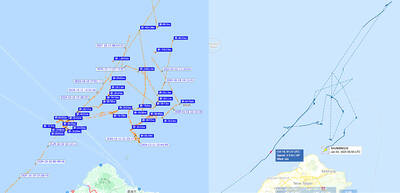Taiwan is one of the few countries that does not have Confucius Institutes — outposts of the Chinese government that have sprung up around the world — but local academics are eager to look into the strategic considerations of the cultural centers.
Under a two-year project at Academia Sinica’s Center for Asia-Pacific Area Studies, researchers tentatively concluded that political outreach in the form of language teaching and cultural exchanges aimed at improving China’s image abroad has been met with concern about academic autonomy in host institutions.
“There are three T’s and one D seen as taboo in Confucius Institutes — Taiwan, Tibet, [the] Tiananmen Square [massacre] and the Dalai Lama … Falun Gong is also an absolute no-no,” said Michael Hsiao (蕭新煌), chairman of Academia Sinica’s Institute of Sociology, who leads the project.
Hsiao said he learned the implicit rules about off-limit topics during interviews with staff at host institutions in Southeast Asian countries and in the US during his fieldwork.
A large part of the project was to collect empirical evidence on how China implements the institutes, the impact on host countries and how they respond to the strategy.
China established the Office of Chinese Language Council International — known as Hanban — under the State Council in 1987 to promote Chinese language learning worldwide.
The office launched an initiative to establish Confucius Institutes within higher education institutions in 2004, following a related program which partners with schools abroad to open “Confucius Classrooms.”
The institutions are named after Confucius, a philosopher in ancient China, who believed a harmonious society is built on personal morality.
According to last year’s annual report, there are 358 institutes, and 500 Confucius Classrooms in 105 countries, Hsiao said.
The Chinese government’s goal is to exceed 1,000 insitutes by 2020, Hsiao added.
The rapid increase in the number of institutes gives Beijing convincing evidence of the initiatives’ success, Hsiao said.
From 2006 to last year, the growth rate in Confucius Institutes was 586 percent, with the number of institutes jumping from 125 to 858.
The number of countries hosting the offices increased from 49 to 105, a 114 percent increase, he said.
There are reportedly more than 40 countries and more than 200 institutions still on the waiting list for such projects, he added.
“It’s a smart move. However, criticism has arisen,” Hsiao said, when presenting a paper which examines the risk of the initiative and China’s “soft power” diplomacy at an international workshop titled: “Confucius Institutes in Asia and Beyond” on Nov. 30 at Academia Sinica.
There have been several disputes in universities in the US and Europe about whether to accept Confucius Institutes, and these cases “really show that money talks,” Hsiao said.
“People in favor of the institutes say they bring in revenue and provide opportunities for students to learn Chinese. Those opposed to the initiative worry they place limitations on academic freedom and dislike the political machinations behind them,” he said.
Hsiao said knew of one case where a professor was ousted from her position as director of an Asia-Pacific study center and transferred to another department because she was opposed the institutes.
“How do they work? She told me that China gives money to people who are not well known and who will research from peripheral and insignificant positions and thus develop pro-China attitudes. They just buy you out,” Hsiao said.
China spends large amounts on the project, Hsiao said. From 2006 onwards, the initative’s annual budget was 350 million yuan (US$56.2 million), 460 million yuan, 820 million yuan, 1.23 billion yuan, 859 million yuan and 1.21 billion yuan, he said.
Confucius Institutes have two defining features which contrast them with the likes of the Goethe Institute or the British Council, said Wang Juei-chi (王瑞琦), a research fellow at the Institute of International Relations (IIR) at National Chengchi University.
First, they are funded by the Chinese government and operate under its guidelines and directions via a Beijing headquarters.
Second, they are affiliated with higher-education institutions and operate within host universities on a partnership basis, while the financing is shared between Hanban and host institutions, Wang said.
Such attributes combined with Hanban’s funding for facilities, maintenance, teachers, and educational materials have raised concerns about their influence on academic freedom and the possibility of industrial espionage, she said.
A study of the implementation of Confucius Institutes in Thailand, by Alan Yang (楊昊), an assistant research fellow at the Institute of International Relations, said China is “extremely strict in its review of political attitudes of volunteers” who work and teach at the institutes.
Participants are required to state their “social connections” and “political inclinations.”
They are also required to make a political declaration that they “do not participate in the Falung Gong movement or any other activities that harm China’s national interests,” Yang said.
Hsiao described how Chinese teachers and volunteers are more like “civil diplomats” rather than “academics.”
In Thailand, China places particular emphasis on the training of Thai-Chinese teachers.
The Thai government selects teachers and college graduates to study in China for one or two years to learn Chinese before they can return to Thailand to teach under a bilateral teaching framework agreement in place since 2006, Yang said.
Yang’s study found that Cambodia is very supportive of the Confucius initiative and mobilizes government staff and Chinese school students to take part in related activities, which “display the obvious intention of the government to promote the initiative.”
Nguyeh Van Chinh, a professor at Vietnam National University, said that Vietnam is the only country in the Mekong region which does not seem to welcome Confucius Institutes.
There is a popular conception in Vietnam that teaching Chinese is not simply about providing language skills, he said.
“It is believed that the language conveys Chinese history, culture and way of thinking to Vietnamese,” he said.
Nguyeh’s study corroborated the finding of Yang regarding how Hanban controls the institutes.
In Thailand, each institute has the freedom to design its own programs, but they must be approved before implementation, he said.
“Hanban places a strong emphasis on the importance of textbooks originating from China and institute’s boards have limited power as they are placed directly under the administration of headquarters in Beijing,” Nguyeh’s study said.
In recent years, China has shifted its focus from Asia to the EU and the US, Hsiao said.
“If you look at the global map of Confucius Institutes, you can see the hierarchy of importance. Europe and North America now have more than three-fourths of all the institutes,” he said.
The initiative is aimed at persuading international society to recognize a new and benign China — it is rising with a civilized, democratic, open and progressive image, despite the fact that it remains unsupportive of human rights, he said.
Chang Mau-kuei (張茂桂), a research fellow at Academic Sinica’s Institute of Sociology, said that through the establishment of the institutes, Beijing tries to use Confucianism to define China.
However, “it is always a problem to use Confucianism to represent China,” Chang said.
“In China, Confucius temples were never built by the people. They were always built by the state, by the empire, by the dynasty. Confucianism is a state ideology. Even today, on Confucius’ birthday, it’s the state leaders or the mayors who go there to pray. So we can say Confucius represents guan wen hua [官文化, official culture], not China,” Chang said.
Confucianism is only part of China, Chang added.
“You have to add Muslim, Uyghurs, Tibetans, Buddhism and numerous minority people to encapsulate the entire China,” he said.
The institutes serve as “state cosmetics” and do not help understanding of the real China, Chang said.

DEEPER REVIEW: After receiving 19 hospital reports of suspected food poisoning, the Taipei Department of Health applied for an epidemiological investigation A buffet restaurant in Taipei’s Xinyi District (信義) is to be fined NT$3 million (US$91,233) after it remained opened despite an order to suspend operations following reports that 32 people had been treated for suspected food poisoning, the Taipei Department of Health said yesterday. The health department said it on Tuesday received reports from hospitals of people who had suspected food poisoning symptoms, including nausea, vomiting, stomach pain and diarrhea, after they ate at an INPARADISE (饗饗) branch in Breeze Xinyi on Sunday and Monday. As more than six people who ate at the restaurant sought medical treatment, the department ordered the

A strong continental cold air mass and abundant moisture bringing snow to mountains 3,000m and higher over the past few days are a reminder that more than 60 years ago Taiwan had an outdoor ski resort that gradually disappeared in part due to climate change. On Oct. 24, 2021, the National Development Council posted a series of photographs on Facebook recounting the days when Taiwan had a ski resort on Hehuanshan (合歡山) in Nantou County. More than 60 years ago, when developing a branch of the Central Cross-Island Highway, the government discovered that Hehuanshan, with an elevation of more than 3,100m,

Taiwan’s population last year shrank further and births continued to decline to a yearly low, the Ministry of the Interior announced today. The ministry published the 2024 population demographics statistics, highlighting record lows in births and bringing attention to Taiwan’s aging population. The nation’s population last year stood at 23,400,220, a decrease of 20,222 individuals compared to 2023. Last year, there were 134,856 births, representing a crude birth rate of 5.76 per 1,000 people, a slight decline from 2023’s 135,571 births and 5.81 crude birth rate. This decrease of 715 births resulted in a new record low per the ministry’s data. Since 2016, which saw

SECURITY: To protect the nation’s Internet cables, the navy should use buoys marking waters within 50m of them as a restricted zone, a former navy squadron commander said A Chinese cargo ship repeatedly intruded into Taiwan’s contiguous and sovereign waters for three months before allegedly damaging an undersea Internet cable off Kaohsiung, a Liberty Times (sister paper of the Taipei Times) investigation revealed. Using publicly available information, the Liberty Times was able to reconstruct the Shunxing-39’s movements near Taiwan since Double Ten National Day last year. Taiwanese officials did not respond to the freighter’s intrusions until Friday last week, when the ship, registered in Cameroon and Tanzania, turned off its automatic identification system shortly before damage was inflicted to a key cable linking Taiwan to the rest of